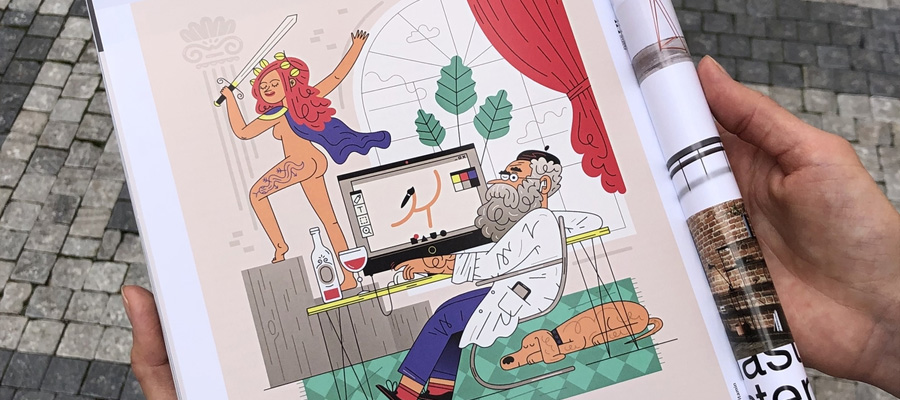Even when we ask for creative criticism, do any of us actually enjoy receiving it? No matter how well-meant or nicely worded, criticism tells us we didn’t get it right the first time - and that hurts. The experience is worse when it’s cruel, harsh, or ruthless.
That said, feedback on our work can be incredibly helpful when we deal with it effectively.
Not sure how to do that?
Check out our 7 tips and apply them the next time someone critiques your work.

illustration by tubik.arts
1. Be Enthusiastic About Dealing With Critics
One of the best things you can do for yourself is to try to develop an enthusiasm for dealing with critics. You’re always going to receive criticism. Some of it will be justified, and some of it won’t be. Some will be worded respectfully, and some will sound nasty. The way it affects you, and the way you respond, is down to your mindset.
Keep reminding yourself that genuine criticism, however it’s worded, is an opportunity to learn, grow, and do better. It can also offer you the chance to reexamine your motives, method, and technique, and to affirm your choices and your work. Becoming enthusiastic about dealing with creative criticism won’t make you immune to its harmful aspects, but it can help you take it in your stride, and to cut through the crap to get to the aspects that can be helpful.
If someone has put time and thought into giving you a genuinely constructive critique, acknowledge their effort by thanking them sincerely, and letting them know you appreciate it. This doesn’t mean you agree with them, of course. It’s just the mature thing to do.
2. Assess Your Critic Intentions
Most of the creative criticism that comes your way will be genuine, whether or not you agree with it. However, there may be times when the person who’s doing the criticizing is trying to manipulate you, or they’re simply having a bad day.
Don’t waste your time with critiques that aren’t genuine.
Do your best to assess the person’s intentions. If those intentions have nothing to do with honest feedback, move on. If their intentions are good and will guide you toward compiling the perfect portfolio, you know that it’s worth considering the positives and negatives in their feedback.
3. Feel Your Feelings
Criticism, in whatever way it’s delivered and whatever the subject, can stir up all sorts of emotions. You’ll be tempted to ignore those emotions, especially when they are negative. Don’t give in to that temptation. Allow yourself to feel your feelings, and then let the person know how you feel but do it calmly and creatively, even if it means sleeping on it and emailing in the morning.
As important as it is to acknowledge your feelings, you shouldn’t let them determine your actions. Be as objective as possible after acknowledging your emotional response to the criticism, and assess it to determine whether it’s creative, destructive, or warranted.
4. Try Something New
Some criticism is worth taking seriously. If you agree that your critics have a point when they say that something you’re doing isn’t doing it for them (or if you realize it’s not doing it for you), it may be time to change things up. You can think of their feedback as market research. Sometimes, brands need to explore new markets, and maybe you do too.
Try doing something different, either with your existing skill set, or by learning a new skill. If you’re a logo designer, try your hand at textile design, if you’re an artist, invest in a photo printer to print postcards of your work, or if you’re a painter, try painting on pottery instead. You may find your niche wasn’t what you expected, or you’re talented in totally different ways to what you imagined. Don’t let fear of failure or the possibility of negative criticism hold you back.
5. Don’t Let Rejection Stop You
Occasionally, the creative criticism you receive will be in the form of a rejection letter. Don’t let that discourage you from continuing to get your work or yourself out there. Remind yourself that you can please some people some of the time, but you can’t please everyone all the time.
If your work is rejected by one publisher, publication, gallery, or agency, and you feel that their criticism wasn’t entirely deserved, try others. If you find that you receive more rejection letters with constructive feedback, consider making a few changes or tweaks in line with it. Or try putting your work out there yourself, such as by going the self-publishing route.
6. Get A Second, Third, and Fourth Opinion
One person’s creative criticism is not representative of everyone else’s opinion, and there will come times when you need to remind yourself of this. No matter who they are, their opinion is not the be-all and end-all.
Get a second, third, and even a fourth opinion, and try to ask a diverse audience what they think of your work. If possible, publish an online portfolio and ask for comments. This will give you a broad overview of opinions from people who may not know you personally.
As a creative, there will be times when you’ll need to stand your ground and defend your work. There’ll also be times when making a few adjustments is the best thing you can do. Don’t make changes lightly, however. Your artistic integrity is important.
7. Remember, Good Creative Work Is Discussed
There’s no such thing as bad publicity, or so the old saying goes. If your creative work is good, it will be discussed, and it will be criticized. Some critics will love it, and others will hate it. Regardless of their feelings, they will have engaged with your work, and they may inspire others to do the same. As a creative, what more could you ask for, really?
Remind yourself that good creative work will elicit a response. You’d have a good reason to be worried if no one said anything at all about your work. Non-engagement arguably could be the most glaring negative criticism.
You’re Not Alone
Criticism might not always be pleasant, but no one is immune to it. When you or your work are criticized, remember that you’re not alone. Some of the greatest creative people and some of the biggest creative success stories in modern history were initially met with criticism and rejection.
Dutch Impressionist painter Vincent van Gogh’s paintings were scorned and ridiculed during his lifetime, but today his artwork is appreciated around the world. Lord of the Rings author J. R. R. Tolkien’s novels were panned by several critics when they were first published. J. K. Rowling’s first Harry Potter novel was rejected 12 times before a publisher accepted her pitch. Art is subjective, and sometimes it just needs the right people to see it. Don’t let the critics get you down. Deal with their feedback effectively, and focus on building a business, brand or product that’s the best it can be.





















